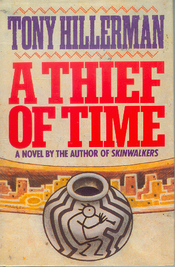
by Andrew Smith
Title: Grasshopper Jungle
Author: Andrew Smith
Published: 2014
ISBN-13: 978-0-525-42603-5
Publisher: Dutton
Twitter: @marburyjack
What’s Auntie Reading Now? picture
This one has mutant praying mantises which eat the world, horny teenaged boys, and a protagonist who is confused beyond what he considers normal for an adolescent.
History chews up sexually uncertain boys, and spits us out as recycled, generic greeting cards for lonely old men. (p. 30)
If history were written the way Austin Szerba told it, more people would be interested in history. On the other hand, Austin’s honesty about life in his dying small town in Iowa, his love for his girlfriend Shann, and his confusing love for his best friend Robby might be more than people might want to know.
Grasshopper Jungle is such a funny story, even while dealing with the grim realities of being a teenager in any time and place. What happens is so fantastical that the science fiction/ fantasy nerd in me giggled even while hurting for Austin and his confusion about being attracted to both Shann and Robby.
A thing I learned about in my reading for February is called bisexual erasure. Basically, it’s the ridiculous premise that there’s no such thing. It turns into another way to marginalize people who identify as bi. Being bi means someone’s not gay enough to be gay, and is thus unwelcome in the gay community. It also means that they’re not straight and have no place in the straight community. Bi people can buy into this as they try to make sense of their feelings.
Everything makes Austin horny. He is, after all, an adolescent boy. But when he thinks about how much he liked kissing Robby on the roof of a building in the minimall they hang out it, some form of “but I’m not gay” enters his thought processes. It gets even more confusing when he fantasizes about a three-way with Robby and Shann. Horniness is its own character in Grasshopper Jungle. Every action, every thought is laden with horniness. Austin isn’t equipped to deal with this. All he can do is write his history and try to sort things out.
As if Austin’s life weren’t complex enough, enter the giant, horny praying mantises accidentally unleashed by the boys while hiding from the bullies from a rival high school.
To dwell on the sexual aspects of this book is to give short shrift to the apocalyptic story line. The mutant praying mantises may be horny, but they are also hungry and set about eating their way through the humans of the world. Leaving the world a lonely, shiny toy box for the survivors, most especially Austin and Robby.
The deluxe underground compound the three kids stumble upon is its own special kind of character. Straight out of the 1970s when smoking was in and shag carpet was the height of fashion, the compound has its own history stretching back generations to Austin’s grandfather crossing the Atlantic from Poland, winding up in Iowa and building a successful urinal company.
The survivors amount to Shann, Robby, and Austin with assorted parental units. And the baby Shann has from the mid-apocolyptic sex she has with Austin in the compound’s bowling alley.
It’s a new world when they emerge back into the world. Ending in the pristine snow of a sharp winter day as Robby and Austin get set to ransack the world for supplies and nifty cars it feels as though, despite the dismal prospects, life is normal and goes on, even in the face of the stark new reality they face.
Histories are actually full of conjectures. Those conjectures become so accepted by descendants and readers that time itself is forced to rearrange its own furniture. This is a new history and I cannot do such a thing. (p. 367)




 Foy by Gordon Atkinson
Foy by Gordon Atkinson




You must be logged in to post a comment.